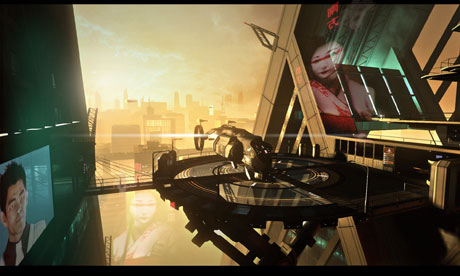
Rebooting any much-loved fiction can be a poisoned chalice. How to differentiate form and evolve the source material while maintaining consistency, coherency and respect? Certainly, you can count on a fanbase that will scrutinise your every move, splintering yet further as you introduce new ideas and creases that impact upon that unblemished view of the original. It's a challenge Richard Morgan knows only too well. For four years the science fiction author has been working with Starbreeze Studios to create the narrative for Syndicate, a reboot of the 1993 classic PC strategy game. Set in a cyberpunk world, Syndicate is only the second video game that Morgan, who has written novels, comics and screenplays, has worked on. His other game project, Crysis 2, had no grand fiction to adhere to, so how has he found approaching a property with such a fanatical, vociferous following?
"We had the IP bible for the original Syndicate on hand for reference when we were putting together our 2069 world and its assumptions, and there was a conscious effort to include elements from that stock that fans of the original game would recognise," he explains. "For example, you'll find yourself playing as an agent for EuroCorp, one of the syndicates from the original game, and behaving pretty much the way you'd expect an agent from the original game to behave. Fans of the old game are certainly going to recognise the furniture and they'll see some legacy pieces in freshly minted action too."
Morgan has been working on the game's script since 2008, flying out to Starbreeze's offices in Stockholm on a regular basis for meetings to ensure the storyline synchs with level design and gameplay requirements or writing from home.
"What needs saying, I think, is that the underlying theme of the original Syndicate is one which transcends the game itself and stands alone as a classic concern of the science fiction genre in general," he says. "Syndicate borrowed from an existing memeplex of cyberpunk-derived ideas – corporate power unleashed, the death of government, biotech-enhanced operatives, warfare over data and elite data specialists, alienating night-time cityscapes, ordinary humans as disposable chaff. The reboot has all of this and more, and for a very simple reason – we're not just rebooting Syndicate, we're mining the very same memeplex the original game fed off. My mandate was simply to do something powerful with that."
That "memeplex" as Morgan puts it, continues to be one of the most enduring in science fiction. What is the ongoing appeal of cyberpunk? "Cyberpunk brought two definable things to the table in science fiction – a current of underbelly noir borrowed more or less wholesale from the American hardboiled tradition and an understanding that the future was going to be primarily about the exploration of inner, not outer, space. The latter remains a truth today and doesn't look like changing any time soon; and noir has always told the truth about the human condition – to wit, that humans are a dodgy lot, corruption is an endemic social dynamic and it all ends in tears. Now, with that much truth on its side, how could cyberpunk (and its derivatives) not endure?"
For Morgan, it's this exploration of the fundamental truths of our today that have attracted him to dystopian worlds, and to Syndicate's universe in particular. "The main appeal is that dystopias are an honest extrapolation from the truth of the societies we live in today," he says. "Now, for you and I, the early 21st century may not feel all that dystopian, but try being a sweatshop peon in a Shanghai enterprise zone, an east European sex slave, or a migrant worker without papers in southern California. Dystopia is the world we choose not to see, curled up in the corner of our peripheral vision and snarling quietly. Dystopia is the acknowledgment of what we are as humans, minus a bankrupt rightwing belief in the validity of existing hierarchy. Which, of course, makes dystopian fiction an immensely powerful tool for social critique. If Dickens were alive today, I'm pretty sure he'd be writing cyberpunk of some sort – he'd have seen the potential and leapt on it."
Syndicate is the second blockbuster game that Morgan has worked on in as many years. What's the appeal? "Novel writing tends to be a fairly staid and lonely business – you sit in your room and type, you sit in your room and type – whereas game writing is endlessly collaborative and very dynamic; you're in and out of meetings all the time, knocking ideas back and forth with other members of the team, and the landscape is constantly changing as the game evolves. It's very much an experience in staying fresh, and I value that immensely. An obligation to stay fresh is something I think all writers need."
Of course, while working in video games may gift a writer a fresh approach, this kind of collaboration also comes with sacrifices, not least in bowing to the demands of gameplay designers. "The terrain is very changeable; as the game iterates, you find yourself having to rejig, abandon or reinvent to suit. It's a very organic process and the challenge is to stay flexible, to be able to evaluate the evolving value of your material, but not to get too precious about any particular element."
"But the real key to writing well for a game is to understand and accept that the story is a support structure for the gameplay, and not the other way around. You could have the greatest story in the world set up, but if it cripples the gameplay dynamics then it's still going to make for a shit game. Accepting that fact requires, for a storyteller from any other medium, an exercise in careful humility – which can in itself be an interesting challenge."

